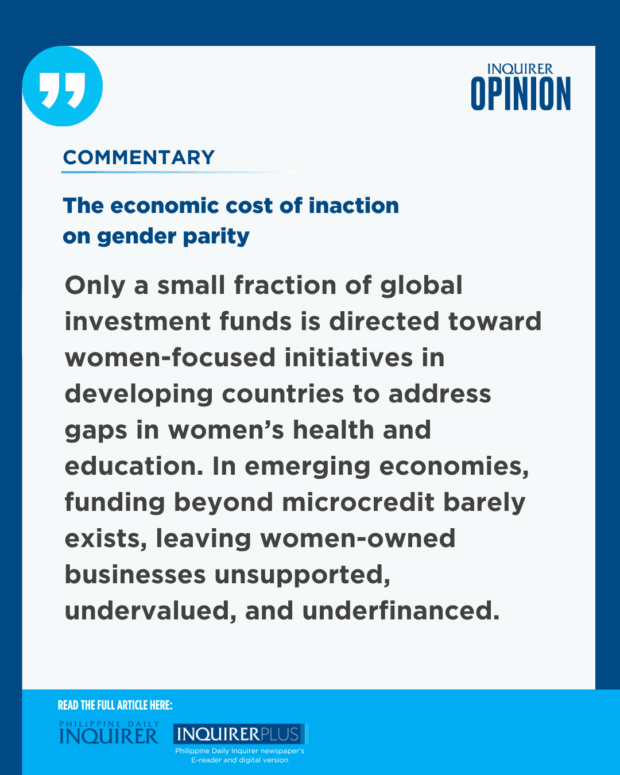The economic cost of inaction on gender parity

As I sat in the gender parity session at the World Economic Forum’s annual meeting in Davos, a familiar frustration engulfed me. Year after year, the best minds and policy experts from around the world gather to discuss the same pressing challenges. Yet meaningful progress in gender parity somehow remains elusive.
The statistics shown at the session represent millions of women whose potential remains untapped, their dreams deferred by systemic barriers we have failed to dismantle. And in this era of technological advancements, it’s unacceptable that so many are still unable to participate in society and the economy.
The math is simple: if women participated in the global economy at the same rate as men, we could double the world’s gross domestic product. This isn’t just about fairness; it’s about economic common sense.
In the United States, women are projected to hold roughly 38 percent of investible assets by 2030. But they continue to be underrepresented on corporate boards: only 6 percent of CEOs worldwide are women, and board seats held by women still hover below 20 percent. Women’s economic exclusion persists, especially in the emerging economies of South Asia.
The RYTHM Foundation works extensively among Southeast Asian communities, where deep-rooted social norms and weak policy enforcement prevent women’s economic participation. In Southeast Asia, entrenched norms and weak policies keep women out of the workforce—only 32 percent of women are in the workforce, according to the World Bank.
An estimated 660 million women are excluded from the workforce due to caregiving responsibilities, which was worsened by the pandemic that put many women out of work entirely.
Only a small fraction of global investment funds is directed toward women-focused initiatives in developing countries to address gaps in women’s health and education. In emerging economies, funding beyond microcredit barely exists, leaving women-owned businesses unsupported, undervalued, and underfinanced.
We’re not just failing women—we are failing our economies. So what will it take to transform the status quo?
The corporate sector has the resources and responsibility to drive change. Equality drives stronger financial outcomes and brings diverse perspectives, fueling innovation and solving challenges.
While some progress has been noted—as in the Philippines which ranks third globally for women occupying 43 percent of senior management posts—true gender parity remains out of reach.
To close the gap, local companies must build clear pathways for women’s growth through mentorship, retention, and support. We need to move beyond performative gestures, and drive real, sustained change before another generation is left behind.
Tangible action must address issues limiting women’s participation and growth. Companies need to implement effective policies to support women’s growth, including shared parental leave, flexible work arrangements, and equal pay. These proven solutions should be scaled across organizations to drive systemic change and benefit all employees.
We also need serious investment in critical areas that prevent women’s economic and career advancement. Women in developing countries often lack access to capital, digital connectivity, and social safety nets. Digital access enables learning and economic opportunities, while capital helps women entrepreneurs. Social safety nets like subsidized health services and disability coverage protect financial progress from emergencies.
We must also reframe conversations from being exclusively a women’s social issue to an economic issue that benefits all, including men. Shifting outdated views requires highlighting the economic benefits and showcasing successful examples of gender-inclusive progress. When women earn, they invest in health, education, and jobs, driving economic transformation.
At RYTHM Foundation, I’ve seen how empowering women uplifts entire communities. Rural women are breaking norms, entering fields like sports and law enforcement, and inspiring the next generation.
Our future hinges on the actions we take today. We already have the data and know the solutions. Companies must move beyond token initiatives and dismantle existing barriers. Investors must back women-led ventures, and policymakers must create environments for women’s economic participation.
Yes, we can’t deny that the barriers are breaking … but they’re not breaking fast or hard enough. Gender parity isn’t just a moral imperative—it’s an economic necessity. So why are we still resisting?
Datin Seri Umayal Eswaran chairs the RYTHM Foundation, the corporate social responsibility arm of the QI Group of Companies that leads transformative initiatives across Asia focused on education, women’s empowerment, and community development. The foundation has reached some 80,000 individuals across over 20 countries and has partnered with at least 115 organizations to launch more than 50 sustainable projects.




















